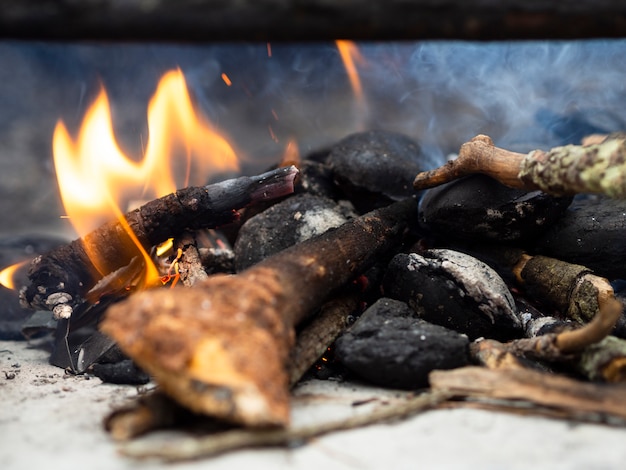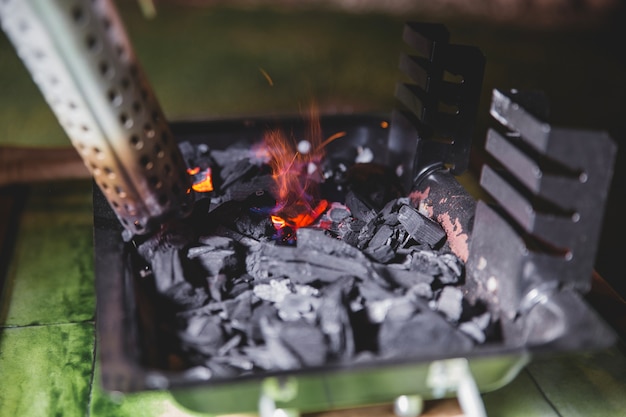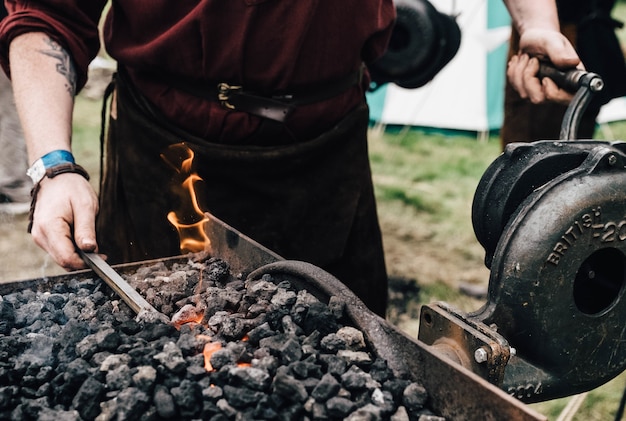What fuel do you need for a charcoal BBQ?
If you’re planning a barbecue in the UK, one of the key considerations is the type of fuel you’ll need for your charcoal BBQ. Charcoal is a popular choice among grill enthusiasts for its ability to impart a smoky flavor to food and provide consistent heat. In this article, we’ll explore the different types of charcoal fuel available, their pros and cons, and how to choose the right one for your BBQ.
The Basics of Charcoal BBQ Fuel
Charcoal, in its simplest form, is made from partially burned wood that has been processed into briquettes or lump charcoal. Both options have their own advantages and choosing between them largely depends on personal preference and the specific requirements of your BBQ.
Briquettes: Convenient and Consistent
Briquettes are a popular choice for many charcoal BBQ enthusiasts due to their convenience and consistent performance. They are made by compressing charcoal dust, sawdust, or other additives with a binder into uniform shapes, which makes them easier to handle and ignite. Some key benefits of briquettes include:
- Longer burning time: Briquettes tend to burn slower and last longer than lump charcoal, making them ideal for slow-cooking.
- Steady heat: Briquettes provide a steady and even heat, which is crucial for achieving consistent cooking results.
- Predictable temperature control: Due to their uniform shape and size, briquettes allow for better control over the temperature inside the BBQ.
Tip: If you’re planning a long barbecue session, briquettes are a reliable choice as they offer extended burn times.
Lump Charcoal: Pure and Flavorful
Lump charcoal, on the other hand, is the more traditional and natural form of charcoal. It is made by burning wood in the absence of oxygen, resulting in charred chunks of pure carbon. Here are some reasons why lump charcoal might be the right choice for your BBQ:
- Enhanced flavor: Lump charcoal imparts a distinct smoky flavor to your food, which many grill enthusiasts prefer over briquettes.
- Quick ignition: Lump charcoal tends to light faster than briquettes, making it a great option when you don’t want to wait long for your BBQ to heat up.
- Less ash production: Compared to briquettes, lump charcoal produces less ash, making cleanup easier and reducing the chances of ash buildup affecting the airflow in your BBQ.
“Lump charcoal is like the premium fuel for your barbecue. It offers an authentic smoky flavor and quick ignition, perfect for achieving that true grill-master experience.” – BBQ expert John Smith
Choosing the Right Fuel for Your BBQ
When it comes to choosing between briquettes and lump charcoal, it ultimately boils down to personal preference and the specifics of your BBQ session. Here are a few factors to consider when making your decision:
Types of Food
Different types of food require different cooking techniques and temperature control. If you’re planning to slow-cook large cuts of meat or smoke ribs, briquettes may be the better choice due to their longer burn time and ability to provide consistent heat. However, if you’re aiming for a quick and intense sear on steaks or burgers, lump charcoal will offer the desired high heat and smoky flavor.
Budget
Budget considerations also play a role in fuel selection. Briquettes are generally more affordable and widely available, making them a practical choice for regular BBQ sessions. Lump charcoal, on the other hand, can be pricier but offers a more authentic grilling experience for special occasions.
Environmental Impact
If you’re concerned about the environmental impact of your fuel choice, it’s worth noting that some briquettes may contain additives or binders that are not environmentally friendly. Look for briquettes made from sustainable sources or consider using lump charcoal, which is typically more natural and produces less waste.
In conclusion, the type of fuel you choose for your charcoal BBQ depends on factors such as convenience, flavor preference, cooking techniques, budget, and environmental considerations. Whether you opt for the convenience of briquettes or the pure smoky flavor of lump charcoal, both options can help you create delicious grilled masterpieces for your next barbecue gathering in the UK. Enjoy the grilling experience!
What Fuel is Used in BBQ?
Barbecuing is a beloved pastime in the UK, especially during the warmer months. But have you ever wondered what fuel is used to cook those delicious grilled meats and veggies? Let’s explore the most common types of fuel used in BBQs.
Charcoal
Charcoal is a classic choice for barbecuing in the UK. It provides a smoky flavor and even heat distribution, resulting in that authentic BBQ taste. There are two main types of charcoal: briquettes and lumpwood.
Briquettes are made from compressed charcoal dust and other additives, ensuring a consistent burn time and temperature. They are often cheaper and provide longer cooking times, making them ideal for slow-cooked dishes.
Lumpwood charcoal, on the other hand, is made from natural hardwood. It ignites quickly and produces an intense heat, perfect for searing steaks or cooking food with a shorter cooking time.
Propane Gas
Propane gas is another popular fuel choice for BBQs in the UK. It offers convenience and ease of use, as it can be easily ignited with the turn of a knob. Propane gas grills also allow for precise temperature control, making them suitable for both quick grilling and low-and-slow cooking.
One of the advantages of using propane gas is that it burns clean, without producing excessive smoke or ash. This makes cleanup a breeze compared to charcoal grills. Moreover, propane gas is readily available in disposable cylinders or refillable tanks, ensuring you never run out of fuel.
Wood Pellets
Wood pellets are gaining popularity among BBQ enthusiasts in the UK. Made from compressed sawdust and natural wood fibers, these small pellets provide a distinct smoky flavor to your dishes.
Wood pellet grills use an automated system to feed the pellets into a fire pot, ensuring a consistent heat source. This allows for precise temperature control and the ability to smoke, grill, or bake your food.
For those who crave the taste of real wood-fired BBQ, wood pellets are an excellent choice.” – BBQ aficionado
Now that you know about the different fuel options, it’s time to fire up your BBQ and enjoy a tasty outdoor feast. Whether you prefer the traditional smoky flavor of charcoal, the convenience of propane gas, or the unique taste of wood pellets, there’s a fuel type that suits your grilling style.
Is Charcoal a Good Fuel?
Charcoal has long been used as a traditional cooking fuel in many cultures around the world. With its high heat output and unique flavor, it is favored by barbecue enthusiasts for grilling and smoking meats. But is charcoal a good fuel? Let’s explore its advantages and disadvantages.
Advantages of Charcoal
1. High heat output: Charcoal burns at a higher temperature than other fuels, making it ideal for searing and achieving that perfect char on your food.
2. Longer burning time: Unlike other fuels, charcoal burns slowly, allowing for extended cooking sessions without needing to replenish the fuel frequently.
3. No chemical additives: Natural charcoal is made from burning wood in a controlled environment, without the use of chemicals or additives. This makes it a healthier option compared to some other types of fuel.
Disadvantages of Charcoal
1. Environmental impact: Charcoal production contributes to deforestation and releases carbon dioxide into the atmosphere. However, using sustainably sourced charcoal can help minimize its impact.
2. More expensive: Compared to other fuels such as gas or propane, charcoal can be more expensive, especially when using high-quality briquettes.
3. Longer ignition time: Charcoal takes longer to ignite compared to other fuels, requiring additional time for preheating before you can start cooking.
Charcoal provides a unique smoky flavor to grilled food, enhancing the taste and aroma. It is particularly popular for barbecuing meats, as it imparts a delicious charred taste that cannot be replicated with other fuels.
So, is charcoal a good fuel? It depends on your preferences and the specific cooking method. If you enjoy the distinct flavor that charcoal imparts to your food and are willing to invest in quality charcoal, it can be an excellent choice. However, if environmental concerns or convenience are important factors for you, alternative fuels like gas or propane may be more suitable.
| Advantages | Disadvantages |
|---|---|
| High heat output | Environmental impact |
| Longer burning time | More expensive |
| No chemical additives | Longer ignition time |
What is Charcoal Made Out of?
Charcoal is a versatile and widely used material that has been around for centuries. It is primarily made from organic matter, typically wood, although other materials such as coconut shells or peat can also be used. The process of creating charcoal involves heating the organic matter in a low-oxygen environment, a process known as pyrolysis.
The Process of Making Charcoal
During pyrolysis, the organic matter is heated to high temperatures, typically between 400-700 degrees Celsius. The lack of oxygen prevents the organic matter from burning completely, resulting in the production of charcoal. The volatile components, such as water and gases, are evaporated, leaving behind carbon-rich charcoal.
The type of wood used in the production of charcoal can impact its properties and uses. Hardwoods, such as oak or maple, are commonly used as they produce a dense and long-lasting charcoal that burns at a steady rate. Softwoods, like pine or spruce, yield a lighter and easier-to-ignite charcoal, making them suitable for quick-grilling applications.
Benefits of Using Charcoal
Charcoal has numerous benefits and applications, making it a popular choice for various purposes. Some of the key advantages include:
- Cooking: Charcoal is widely used as a fuel source for barbecues and grills due to its high heat output and ability to infuse food with smoky flavors.
- Purification: Activated charcoal is commonly employed in water and air filtration systems to remove impurities and odors.
- Art and Drawing: Charcoal is a favored medium for artists, allowing for rich, dark lines and shading in drawings and sketches.
- Medicine: Charcoal is used in medical treatments, particularly for its ability to absorb toxins and chemicals in cases of poisoning or drug overdoses.
“Charcoal is not only a fuel source but also finds applications in various industries due to its unique properties.”
What is the Best Fuel for Charcoal Spit?
The Importance of Choosing the Right Fuel
Choosing the best fuel for your charcoal spit is crucial to achieving the perfect flame and imparting delicious flavors to your food. The type of fuel you select can significantly impact the taste, cooking time, and overall experience of using a charcoal spit. Let’s explore some popular options below:
1. Charcoal Briquettes
Charcoal briquettes are one of the most common fuels used in charcoal spits in the UK. They are made from a mix of charcoal dust, sawdust, and binders, compressed into uniform shapes. These briquettes provide a consistent heat output and burn for a longer period, making them ideal for slow-cooking meats.
2. Lump Charcoal
Lump charcoal is another excellent option for charcoal spits. It is made by burning natural hardwood in the absence of oxygen, resulting in pure charcoal chunks. Lump charcoal ignites quickly, provides high heat, and imparts a distinct smoky flavor to your food. It is also environmentally friendly as it contains no additives or chemicals.
3. Hardwood Logs
If you prefer a more traditional approach, hardwood logs can be a great choice for your charcoal spit. Logs such as oak, hickory, or applewood provide a robust and aromatic smoke flavor. While using logs requires more skill to maintain consistent heat, they offer an authentic BBQ experience and are highly regarded by barbecue enthusiasts.
“The choice of fuel largely depends on personal preference and the desired flavor profile of your dishes.”
4. Charcoal and Wood Combination
Many BBQ aficionados opt for a combination of charcoal and wood for their charcoal spits. This mixture allows for better control of heat levels while adding the aroma and flavor of different woods such as cherry, mesquite, or maple. It’s a versatile choice that offers the benefits of both charcoal and wood.
What Can I Use for Fuel?
In the UK, there are various options available when it comes to choosing a fuel source. Whether you’re looking to heat your home or power your vehicle, it’s important to consider the different options and their impact on the environment.
1. Fossil Fuels
Fossil fuels, such as coal, oil, and natural gas, have long been used as energy sources in the UK. However, these types of fuels are not sustainable in the long term and contribute to greenhouse gas emissions. The UK government has set targets to reduce fossil fuel consumption and transition to more environmentally friendly alternatives.
2. Renewable Energy Sources
Renewable energy sources are gaining popularity and offer a sustainable way to power our homes and vehicles. Options include:
- Solar Power: Harnessing the sun’s energy through photovoltaic panels.
- Wind Power: Utilizing wind turbines to generate electricity.
- Biomass: Burning organic materials like wood pellets or agricultural waste.
- Hydropower: Generating electricity from the flow of water in rivers or tidal movements.
3. Electric Vehicles
As we shift towards a greener future, electric vehicles (EVs) are becoming increasingly popular in the UK. EVs use electricity stored in rechargeable batteries, reducing reliance on traditional fossil fuels. The UK government has implemented incentives to promote the adoption of EVs, such as grants and tax benefits.
Did you know? According to the Society of Motor Manufacturers and Traders (SMMT), EV sales in the UK have increased significantly, with more than 300,000 registered by 2020.
4. Energy Efficiency
Another important aspect to consider is energy efficiency. By using energy-efficient appliances and making small changes in our daily lives, we can reduce our overall fuel consumption and carbon footprint. Simple actions like insulating our homes, using energy-saving light bulbs, and turning off devices when not in use can make a significant difference.
While the UK continues to explore new and innovative fuel sources, it’s crucial for individuals to make informed choices about the fuels they use. By opting for renewable energy sources, embracing electric vehicles, and practicing energy efficiency, we can all contribute towards a greener and more sustainable future.
Conclusion
In conclusion, charcoal can be a good fuel choice for specific cooking needs, particularly when you value the unique flavors it provides. However, it is essential to consider the environmental impact, cost, and convenience factors before deciding on the best fuel option for your circumstances.
In summary, charcoal is primarily made from organic matter through the process of pyrolysis. Wood is the most common raw material used, although other sources like coconut shells can also be employed. The resulting charcoal has various benefits and uses, ranging from cooking and art to water purification and medicinal applications. Its versatility and unique properties make it a valuable and widely utilized substance.
In conclusion, there is no definitive answer to the question of the best fuel for a charcoal spit, as it ultimately depends on individual preferences. However, charcoal briquettes, lump charcoal, hardwood logs, and charcoal-wood combos are popular choices in the UK for their distinct advantages. Experimenting with different fuels and finding your preferred combination can elevate your barbecue experience to new heights. So, fire up your charcoal spit, choose your fuel wisely, and enjoy mouthwatering grilled delights with friends and family!
Comparison Table:
| Fuel Type | Advantages | Disadvantages |
|---|---|---|
| Charcoal Briquettes | Burn for a longer period; consistent heat output | May contain chemical additives |
| Lump Charcoal | Quick ignition; high heat; natural flavors | More expensive than briquettes; burns faster |
| Hardwood Logs | Aromatic smoke flavor; authentic BBQ experience | Requires skill to maintain consistent heat |
| Charcoal and Wood Combination | Controlled heat levels; variety of flavors | Requires careful monitoring |


